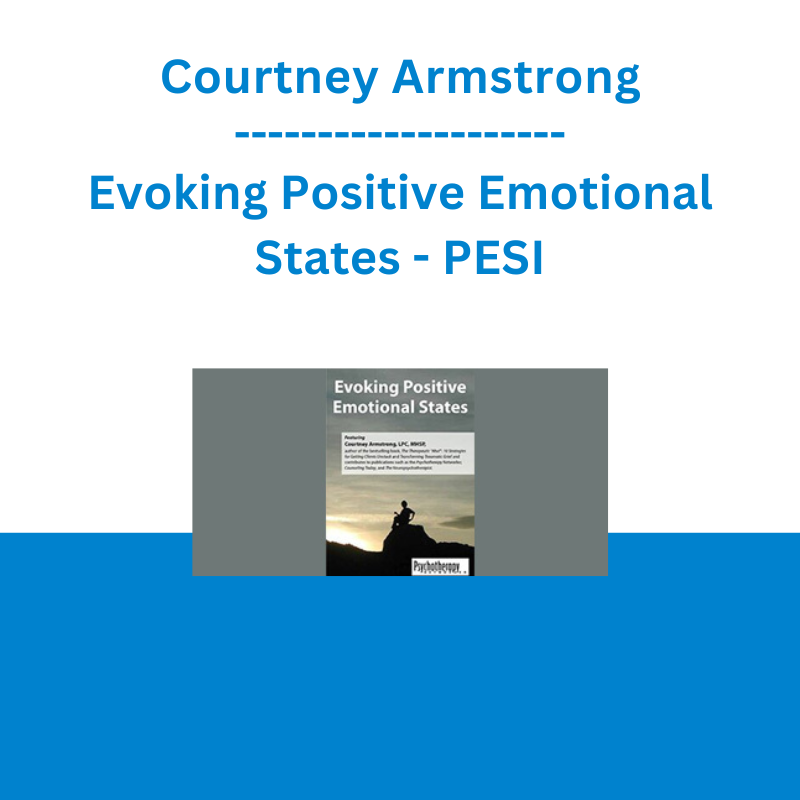*** Proof of Product ***
Exploring the Essential Features of “Courtney Armstrong – Evoking Positive Emotional States – PESI”
Speaker: Courtney Armstrong, LPC, MHSP
Format: Audio and Video
Media Type: Digital Seminar
Description
Research from brain science and positive psychology shows that activating positive emotional states is the fastest route to instilling hope, stimulating creativity, spurring motivation, and empowering our clients.
But how do you help clients access resourceful states when they’re feeling hopeless and helpless?
In this recording, you’ll discover how to gently lead discouraged clients into heartening experiences that enable them to reclaim inner states of peace, strength, joy, and vitality.
Moreover, you’ll have opportunities to evoke your own uplifting states through experiential activities.
Speaker
Courtney Armstrong, LPC, MHSP, is the founder of the Institute for Trauma Informed Hypnotherapy and author of Rethinking Trauma Treatment: Attachment, Memory Reconsolidation, and Resilience. She has over 25 years’ experience and is a board-certified Fellow in clinical hypnotherapy who has trained thousands of mental health professionals nationally and internationally in creative, brain-based strategies for healing trauma. She is a bestselling author of the book, The Therapeutic “Aha!”: 10 Strategies for Getting Clients Unstuck and Transforming Traumatic Grief and contributes to publications such as Psychotherapy Networker, Counseling Today, and The Neuropsychotherapist. She has been featured as a trauma and grief expert on national television and radio programs and is the owner/director of Tamarisk: A Center for Mind-Body Therapy in the state of Tennessee.
Speaker Disclosures:
Financial: Courtney Armstrong is the founder and president of Courtney Armstrong Consulting and Training Services and the Institute for Trauma Informed Hypnotherapy. She receives a speaking honorarium and recording royalties from PESI, Inc. She has no relevant financial relationships with ineligible organizations.
Non-financial: Courtney Armstrong serves on the Clinical Hypnosis Education and Training Committee of the American Society for Clinical Hypnosis. She is a member of the American Mental Health Counselor’s Association, the Tennessee Licensed Professional Counselors Association, and the Chattanooga Area Psychotherapy Association.
Outline
Explain how to help clients access resourceful states when they’re feeling hopeless and helpless.
- State dependent learning and Frederickson’s broaden and build theory
- Self-compassion activities to reduce hopelessness and helplessness.
- Ego states and parts work activities to resolve inner conflicts.
Use imagery techniques to elicit desired emotions and engender positive feelings toward the self and the future.
- Why the emotional brain responds to imagery better than words.
- Breath-Symbol Imagery exercise to elicit desired emotional states.
- Desired Future Self activity to instill hope and motivation.
Articulate ideas, questions, and other interventions in ways that foster hope and boost motivation.
- How to read subtle nonverbal responses and follow the client’s energy.
- Attune, lift, and lead communication strategies that empathically motivate clients and effectively engage the emotional brain.
Determine how to gently lead discouraged clients into heartening experiences that enable them to reclaim inner states of peace, strength, joy, and vitality.
- Imagery for reframing identity.
- Shift emotional patterns with memory reconsolidation
Create music and movement interventions that lift depression, calm anxiety, and empower traumatized clients.
- How music and movement impact the brain and influence emotional states.
- Simple movement activities that increase energy, confidence, and vitality for depressed clients.
- Movement activities that calm anxiety and empower clients.
- How to use rhythm and music playlists to elicit desired emotional states.
Apply playful interventions that optimize learning and reinforce new behaviors in a clinical setting.
- How play optimizes learning and promotes new behaviors.
- Humorous role-play games to decrease anxiety and rumination.
Objectives
1. Explain how to help clients access resourceful states when they’re feeling hopeless and helpless.
2. Use imagery techniques to elicit desired emotions and engender positive feelings toward the self and the future.
3. Articulate ideas, questions, and other interventions in ways that foster hope and boost motivation.
4. Determine how to gently lead discouraged clients into heartening experiences that enable them to reclaim inner states of peace, strength, joy, and vitality.
5. Create music and movement interventions that lift depression, calm anxiety, and empower traumatized clients.
Target Audience
- Psychologists
- Physicians
- Addiction Counselors
- Counselors
- Social Workers
- Marriage & Family Therapists
- Nurses
- Behavioral Health Professionals
Please see the full list of alternative group-buy courses available here: https://lunacourse.com/shop/









